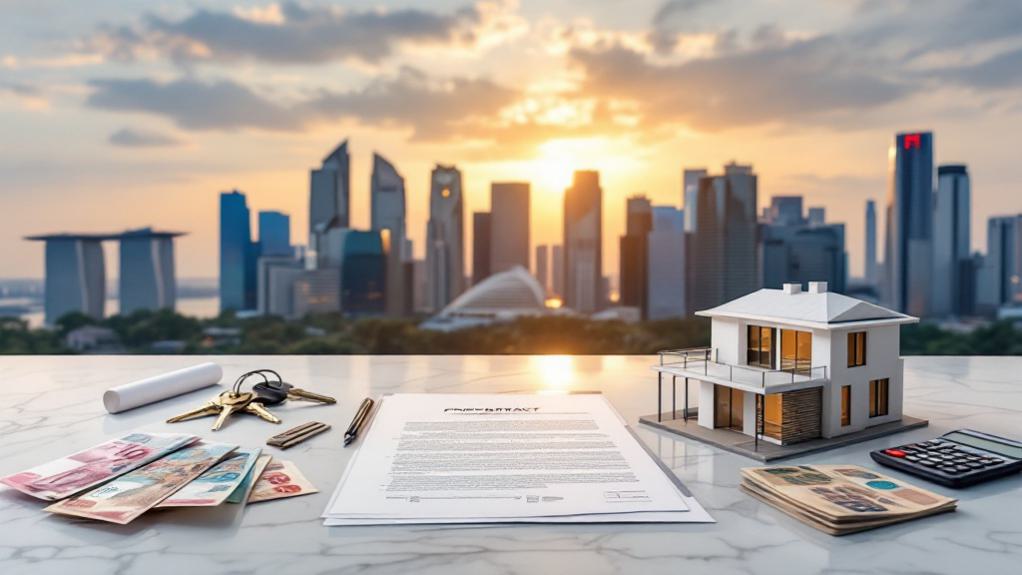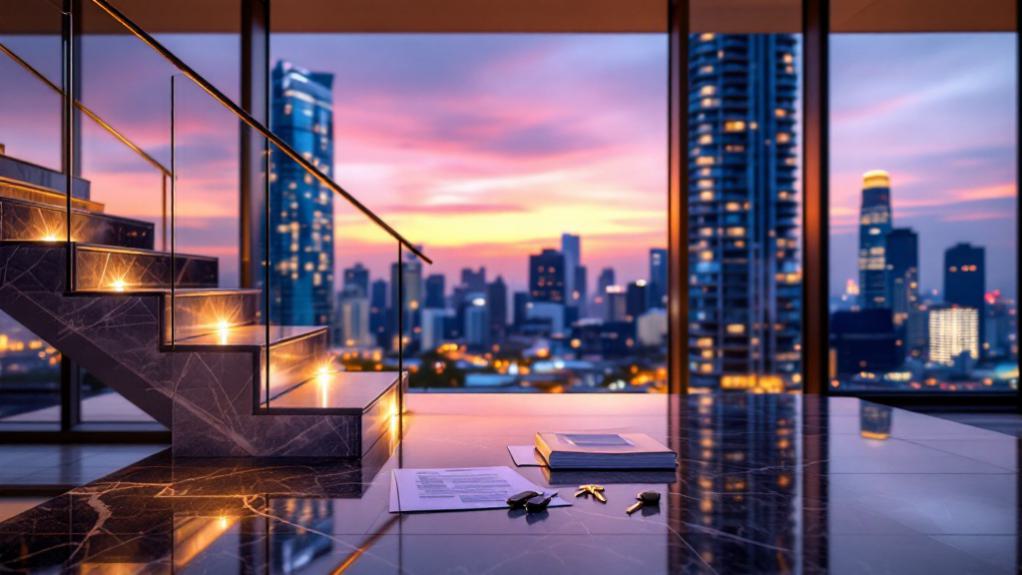Purchasing property in Singapore involves a structured process beginning with eligibility verification based on residential status, followed by financial assessment to meet the 25% down payment requirement. Buyers must engage an agent for market research, secure financing, pay a 1% option fee, and exercise the Option to Purchase within 14 days. The conveyancing process, lasting 8-10 weeks, includes legal searches and documentation review before final payment and handover. Additional considerations include stamp duties, particularly the 60% ABSD for foreigners.

While Singapore’s real estate market presents lucrative opportunities for investors and homebuyers, traversing the complex regulatory landscape requires a thorough understanding of the eligibility criteria, financial implications, and legal processes involved.
The property acquisition framework differentiates markedly between citizens, Permanent Residents (PRs), and foreigners, imposing varying restrictions on the type of properties accessible to each category. Foreigners face the most limitations, being restricted to private condominiums and apartments, while PRs gain additional access to resale HDB flats after a three-year waiting period and executive condominiums after five years. Singapore Citizens must be at least 21 years old to purchase any type of property, with special provisions allowing those under 21 to purchase under a trust. These regulations are directly influenced by the government’s land use policies that carefully balance housing needs with sustainable urban development.
The financial structure for property acquisition mandates a minimum 25% down payment, with loan-to-value ratios capped at 75% for first-time property purchases. Foreign buyers must contend with a substantial 60% Additional Buyer’s Stamp Duty (ABSD), considerably increasing the initial capital outlay. Non-residents also face a flat tax rate of 20% on rental income, compared to the progressive rates applicable to residents, making investment calculations more straightforward but potentially less favorable.
The property acquisition process commences with market research, often facilitated by licensed property agents who provide market insights and coordinate viewings. After identifying a suitable property, the buyer secures it with an Option to Purchase (OTP), paying a 1% option fee.
Within 14 days, the buyer must exercise the option and proceed to sign the Sale and Purchase Agreement, initiating the 8-10 week conveyancing process culminating in final payment and property handover. Engaging a qualified conveyancing lawyer is essential for conducting legal searches and managing the complex documentation required for property transfer.
Prudent buyers conduct thorough due diligence, including verification of property ownership, review of valuation reports, inspection of maintenance records, and assessment of remaining lease periods for leasehold properties.
Financing decisions involve comparing various mortgage products offering fixed and floating interest rates, with loan eligibility determined through In-Principle Approval applications.
Post-purchase considerations encompass property handover procedures, renovation regulations, ongoing maintenance fees, and potential future sale implications, including capital gains tax assessments.
Frequently Asked Questions
Can Foreigners Buy HDB Flats in Singapore?
Foreigners face significant restrictions when purchasing HDB flats in Singapore.
Generally, non-citizens cannot buy new or resale HDB flats independently; however, foreigners married to Singapore Citizens may qualify under the Non-Citizen Spouse Scheme.
Permanent Residents can purchase resale flats after maintaining PR status for three years, while non-PR foreigners have virtually no access to HDB properties unless through marriage to a citizen, subject to ownership limits and eligibility criteria.
What Are the Additional Stamp Duties for Foreign Property Buyers?
Foreign property buyers in Singapore face a substantial 60% Additional Buyer’s Stamp Duty (ABSD), payable within 14 days of purchase agreement signing.
This tax, applied on top of the standard Buyer’s Stamp Duty, represents a significant market cooling measure implemented by the government.
Certain nationalities, including Americans and Swiss, are exempt due to Free Trade Agreements, while trustees and entities face an even higher 65% ABSD rate, calculated on the property’s purchase price or market value.
How Long Does the Property Buying Process Typically Take?
The property acquisition timeline varies considerably based on property type in Singapore.
HDB resale transactions typically conclude within 8-12 weeks from application to completion, while private resale properties generally require 10-12 weeks from option to completion appointment.
New launch condominiums represent the longest investment horizon, spanning 3-4 years from launch to key collection, with progressive payment schedules structured throughout the construction period, subject to regulatory approvals and documentation processing.
Are There Restrictions on Buying Property Near Military Installations?
Singapore does not impose specific restrictions on property purchases near military installations within its general foreign ownership framework.
However, overseas buyers should note that some areas with military significance may be unofficially scrutinized more thoroughly during the approval process.
The Residential Property Act, which governs foreign property acquisition, provides authorities with discretionary powers when evaluating purchases that could potentially impact national security considerations or involve strategically sensitive locations.
What Financing Options Are Available for Permanent Residents?
Permanent residents in Singapore can access several financing avenues, including bank loans with a maximum loan-to-value ratio of 75% for first properties.
They can also utilize their CPF Ordinary Account savings for both down payments and monthly mortgage installments.
PRs may also qualify for specific government grants, such as the Enhanced CPF Housing Grant of up to $80,000 for eligible PR-SC couples.
Additionally, they can access the Family Grant of up to $50,000 for first-timer PR families purchasing resale flats.





